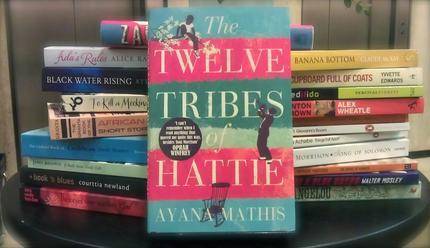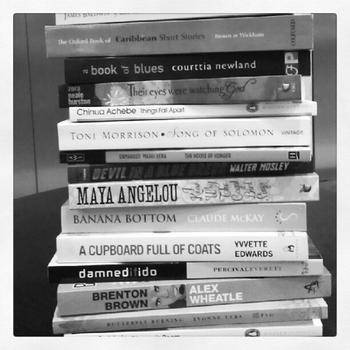Black Interest and You
Marisa Henderson

The most common question I often hear is, "Why Black Interest? Why segregate the authors? Isn't that offensive?" Admittedly they are three questions but they never arrive solo and are usually accompanied by bunched eyebrows and frequent shakes of the head. Maybe because 'race' is taboo and it highlights this; it pushes quiet thoughts and whispers out in to the open and causes confusion. The 'race' conversation usually sits somewhere between the unresolved issues of history and the controversy of acknowledging our cultural differences. And within this, somehow we manage to miss the celebrations, skipping befores and afters and settling for a period of time that has somehow become defining; significant yes but never defining. Our basic Secondary School education quickly highlights the horrors of Slavery and its impact on the Industrial Revolution and leaves us there with a million questions and no open forums to constructively discuss them. So the questions remain, "Why Black Interest? Why segregate the authors? Isn't that offensive?" I often struggle with the answer possibly because I feel as if my own ethnic origin quickly answers the questions before I even have the opportunity to voice my opinion, "I know why you would want this section but ..."
It's simple really. It's just an invitation.
I work in central London in what is currently the largest bookshop in Europe. It is five floors filled to the brim with books covering subjects from academia to travel. If you are a book lover, it is a place that deliciously swallows time. The first floor is the Fiction floor and in a spacious corner there are three bays of books dedicated to stories by and featuring black people. These books cover an array of eras and authors from all over the world and this is where you will usually find me; dusting and rearranging, trying to find those unknown gems to recommend to you, the customer. It is known, affectionately, as the Black Interest Section.
There are recognisable names of course such as Toni Morrison, James Baldwin, Zadie Smith and Maya Angelou (okay, she isn't fiction but I couldn't not include her) who are all present and familiar who write stories you have read or even heard about. Yes, we do include black authors in our general fiction too and on our tables pilled high with paperbacks. But my motivation for the Black Interest Section is to provide a spectrum of books that hopefully is a true representation of the diversity of black people; our experiences, challenges and celebrations, our perceptions of the world. With five floors of books we also have the space to house it, so why wouldn't we?

The spectrum is something that historically doesn't exist in sections that claim to be books specifically of black interest. It isn't uncommon to see shelves stacked with books from across the pond, covers displaying barely clad females and a smoking gun lingering somewhere in the background. Or those historical novels that have crept into the mainstream, noted for their social commentary on days most of us have missed. They all serve their purpose of course but the lack of spectrum is so prominent that it is easy to believe that books of black interest are two stories deep. And it wouldn't be fair to not acknowledge the issues that publishing may have in regards to its lack of diversity but I guess that's another story for another time.
Having this space means I have the chance to invite you into the worlds and minds of some unforgettable characters that are easily ignored. When read, they have the ability to stay with you long after their final pages, creeping into your reality and shaping some of your life choices. That for me is a sign of a good read; despite geography and time an author is able to give an insight and a perspective that otherwise would never be available; entertaining and educating in roughly three hundred pages. Of course you can find something familiar in any book, something you can relate to and paint your own experiences across, closing the book feeling as if you've had a conversation beyond the mind. But we all wear different hats daily, mine being a woman, a daughter, a mother, a friend, a lover, all of these aspects crammed into one person. I can read A Room With A View and relate to the struggle of womanhood, the struggle of the worlds interpretation of me and sometimes the rebellion that may follow. But if I'm honest my story wouldn't sound the same and this goes beyond time and geography; my ethnic origin adds a different aspect, maybe even a different perspective. The first time I read Their Eyes Were Watching God the struggle of defining myself in a world full of misunderstandings was something Zora Neale Hurston whispered to me so effortlessly and left me searching for my own Teacake, believing he truly existed, with this skin colour and this upbringing and these social experiences, happiness could be found at the end of any dirt road.
Here, with these three bays I am lucky enough to share my own story in the words of others. But it goes beyond just my story, there are hundreds, books that deliver a vast palette of stories, that could never be painted 'black' when in their reality, exist in a realm or a plane of their own that fill the gaps of those hazy hues within the universe of literature. Somehow I think people translate this into a section that carries the prerequisite of being black to enter, far from it, you just need to be you.
And for the record this is my own opinion, my employers? Well, that's a conversation you will need to have with him and in the meantime if you have a question that goes beyond those three you know where to find me, I'll be in that spacious corner, dusting and rearranging, with you in mind.
Marisa Henderson currently lives in London and has worked as a Bookseller for over two years. She has recently completed an MA in Creative Writing and is currently working on her first novel.
 Close
Close


